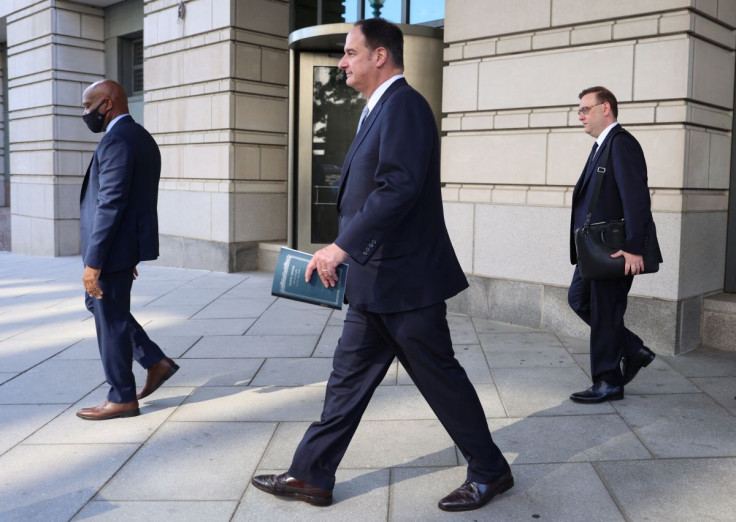U.S. Jury Finds Ex-Clinton Campaign Lawyer Not Guilty Of Lying To FBI

A jury in Washington on Tuesday found a former attorney for Hillary Clinton's U.S. presidential campaign not guilty of lying to the FBI when he met with the bureau in September 2016 to share a tip about possible communications between Donald Trump's business and a Russian bank.
The verdict to acquit attorney Michael Sussmann was a blow to Special Counsel John Durham, who was appointed by former Attorney General William Barr during Trump's administration to probe any missteps in the FBI's investigation into whether Trump's campaign was colluding with Russia.
"While we are disappointed in the outcome, we respect the jury's decision and thank them for their service," Durham said in a statement.
Sussmann was accused of lying to the FBI's former top attorney James Baker at a Sept. 19, 2016, meeting when he said he was not representing any clients as he passed along technical data and white papers that claimed the Trump Organization was secretly communicating with Russia's Alfa-Bank.
His defense team showed seemingly exculpatory evidence that Sussmann billed his law firm, not the Clinton campaign, for his cab ride to the FBI, bolstering his argument that he was not representing the campaign for that meeting.
Durham's team, however, claimed that Sussmann was actually representing two clients: Hillary Clinton's 2016 presidential campaign and Rodney Joffe, a technology executive who personally oversaw the research into the tip tying Trump to Alfa-Bank. The research shared with the FBI was later debunked.
Trump, on his Truth social media platform, lambasted the jury's decision, claiming without evidence that the legal system is "corrupt."
The case against Sussmann was Durham's first to go to trial, and was seen as a crucial test because it rested on a single alleged false statement made in a room with only two people, neither of whom took any notes or recorded the meeting.
Baker, Durham's star witness, had previously given conflicting testimony to Congress and the Justice Department Inspector General about his recollection on whether Sussmann was meeting with him on behalf of any specific clients.
However, Baker testified during the trial that he was "100% confident" Sussmann told him he was not representing any clients - a recollection that was also bolstered by a text message Sussmann sent him a day before their meeting in which Sussmann told Baker: "I'm coming on my own - not on behalf of a client or company."
In a statement after the trial, Sussmann said: "I told the truth to the FBI, and the jury clearly recognized that with their unanimous verdict today.
"I am grateful to the members of the jury for their careful and thoughtful service. Despite being falsely accused, I am relieved that justice ultimately prevailed in this case," he said.
During the trial, prosecutors portrayed Sussmann, formerly a partner with the law firm Perkins Coie, as a privileged high-powered attorney who tried to exploit his political connections by planting damaging and false information about Trump in order to bolster Clinton ahead of the 2016 presidential election.
Sussmann's billing records, they said, also showed that he was representing the Clinton campaign on the Alfa-Bank matter.
Sussmann's defense team, however, denied that he lied to Baker, and said he was never directed by the Clinton campaign to share the Alfa-Bank tip with the FBI.
Multiple witnesses including the Clinton campaign's former top lawyer Marc Elias testified that Sussmann never sought permission to share the tip, and that doing so was not in the campaign's best interest.
In a statement, Sussmann's attorneys on Tuesday called the case an example of "extraordinary prosecutorial overreach."
"Politics is no substitute for evidence, and politics has no place in our system of justice," they added.
© Copyright Thomson Reuters 2024. All rights reserved.





















